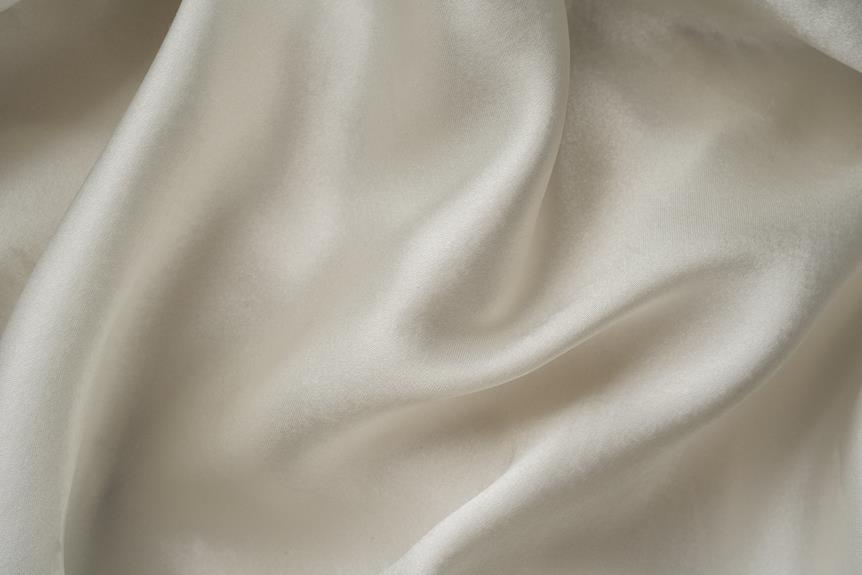Curious about whether silk makes you sweat? Let's unravel the truth about this luxurious fabric.
In this exploration, we'll delve into the breathability, moisture-wicking ability, and insulating properties of silk. You'll discover how silk compares to other fabrics and gain tips for wearing it.
We'll also debunk myths surrounding silk and its supposed sweat-inducing effects. So, sit back and prepare to master the art of wearing silk without the worry of perspiration.
Key Takeaways
- Silk possesses breathability and moisture-wicking properties.
- Silk's breathability keeps you cool and comfortable in warm weather.
- Silk efficiently wicks away moisture from your skin.
- Silk is a natural temperature regulator, suitable for warm and cool environments.
The Properties of Silk
Silk possesses breathability and moisture-wicking properties, which may affect your comfort level when wearing it.
Silk fabric is well-known for its luxurious feel and natural sheen. The properties of silk make it an exceptional choice for clothing, especially in warm weather.
The breathability of silk allows air to circulate close to the skin, keeping you cool on hot days. Additionally, its moisture-wicking properties draw perspiration away from the body, keeping you dry and comfortable.
This makes silk fabric an excellent option for activewear and undergarments as it helps regulate body temperature and prevents the build-up of sweat.
Understanding these silk properties can help you make informed decisions when choosing clothing for various occasions. Whether you're looking for a lightweight blouse for a summer day or comfortable pajamas for a restful night's sleep, the breathability and moisture-wicking properties of silk fabric make it a versatile and practical choice for your wardrobe.
Breathability of Silk
When wearing silk, the breathability allows air to circulate close to your skin, keeping you cool and comfortable in warm weather. Silk's breathability benefits make it an excellent choice for hot and humid climates.
The natural properties of silk fabric enable it to wick moisture away from your body, allowing it to evaporate quickly, which helps in regulating your body temperature. This breathability also prevents the growth of bacteria and odor, keeping you feeling fresh and clean throughout the day.
In comparison to cotton, silk is significantly more breathable. While cotton is also breathable, it tends to absorb and retain moisture, which can leave you feeling damp and sticky in warm conditions. Silk, on the other hand, allows for better air circulation and moisture evaporation, making it a superior choice for maintaining comfort in hot weather. Its lightweight and airy nature further enhance its breathability, making it a preferred option for those seeking cool, breathable clothing.
Moisture Wicking Ability
To understand how silk's breathability affects moisture wicking, it's important to recognize its ability to keep you dry and comfortable in warm conditions. When it comes to exercise or hot weather, silk's natural moisture-wicking properties shine.
Silk fabric efficiently wicks away moisture from your skin, allowing it to evaporate quickly, thus helping to regulate your body temperature during physical activities or in hot climates. This means that even when you sweat, silk can help you stay relatively dry and comfortable, unlike synthetic materials that can feel clammy and sticky.
Silk's moisture-wicking ability makes it an excellent choice for activewear, as it can help you stay cool and dry during workouts or outdoor activities. The fabric's ability to manage moisture effectively can also contribute to reducing the risk of chafing and irritation, enhancing overall comfort during exercise.
In hot weather, silk's moisture-wicking properties can be particularly advantageous, as it can help you stay feeling fresh and dry even when the temperature rises. So, when it comes to staying comfortable and dry during physical activities or in warm conditions, silk's moisture-wicking ability makes it a standout choice.
Silk's Insulating Properties
Silk is a natural insulator, helping to regulate your body temperature by keeping you warm in cool weather and cool in warm weather.
Its moisture-wicking properties draw away sweat and moisture from your skin, keeping you dry and comfortable throughout the day.
Additionally, silk is breathable and lightweight, making it an ideal choice for all-day wear.
Silk Regulates Body Temperature
You'll appreciate that silk's insulating properties help maintain a comfortable body temperature throughout the day. Silk's natural ability to regulate body temperature makes it an ideal choice for all seasons.
In cold weather, silk's thermal properties trap body heat, keeping you warm without feeling bulky or weighed down. Conversely, in warm weather, silk wicks away moisture from your body, keeping you cool and dry. This makes silk clothing a versatile option for year-round comfort.
Whether you're sleeping in silk sheets or wearing a silk blouse, you can rely on its insulating properties to help you stay comfortable. When it comes to hair care, silk's temperature-regulating qualities also benefit your locks by minimizing heat damage from styling tools.
Silk Wicks Away Moisture
When wearing silk, your body stays dry and comfortable due to its ability to wick away moisture and regulate temperature.
Silk's natural protein structure allows it to absorb moisture from your skin, keeping you feeling dry and fresh.
The insulating properties of silk help regulate your body temperature, keeping you warm in cool weather and cool in warm weather.
Silk is breathable, allowing air to circulate around your body, preventing sweat from accumulating and creating a cooling effect.
Proper care of silk garments, such as hand washing or using a gentle cycle in a mesh laundry bag, helps maintain its moisture-wicking properties and prolong its lifespan.
Silk benefits from its moisture-wicking and insulating properties, providing you with a comfortable and dry experience while wearing it. Proper silk care ensures that these properties are maintained over time.
Silk Breathable and Lightweight
Wearing silk allows your body to stay comfortable and dry due to its breathable and lightweight nature, which is attributed to its insulating properties. Silk benefits from its natural ability to regulate temperature, keeping you cool in warm weather and warm in cool weather.
The lightweight nature of silk allows for easy movement and prevents the feeling of heaviness often experienced with other fabrics. This makes it an excellent choice for activewear or everyday clothing.
Additionally, silk care is relatively easy, as it can be hand-washed or dry cleaned, and it maintains its shape and quality over time. The insulating properties of silk make it an ideal choice for those seeking comfortable, breathable, and lightweight clothing options.
Silk and Skin Irritation
If you've ever wondered about the relationship between silk and skin irritation, you're not alone. Silk is known for its breathability and comfort, but some people may experience allergic reactions to this luxurious fabric.
Additionally, understanding how silk wicks moisture away from the skin can be crucial in determining its impact on skin irritation.
Silk Breathability and Comfort
Experiencing skin irritation while wearing silk can be attributed to its breathability and comfort. When considering silk breathability and comfort, it's important to understand that:
- Silk is a highly breathable fabric, allowing air to circulate and moisture to evaporate, keeping you cool and dry.
- The natural protein structure of silk makes it smooth and soothing against the skin, reducing the likelihood of irritation.
- Silk's ability to regulate temperature makes it a comfortable choice for various climates and activities.
- The durability of silk ensures that it maintains its breathability and comfort over time, offering long-term satisfaction.
Understanding these aspects of silk's breathability and comfort can help you make informed decisions about incorporating this luxurious fabric into your wardrobe.
Allergic Reactions to Silk
You may encounter skin irritation when wearing silk due to its potential to cause allergic reactions. Silk allergies can manifest as redness, itching, or hives on the skin. This can be attributed to the natural proteins found in silk, such as sericin, which may trigger an immune response in some individuals.
If you experience skin irritation while wearing silk, consider consulting a dermatologist to confirm whether you have a silk allergy.
To manage sweat and minimize the risk of allergic reactions, opt for silk clothing with breathable weaves and lighter weights, as these can help in sweat management. Additionally, wearing silk garments that allow for airflow and moisture wicking can reduce the likelihood of skin irritation, making your experience with silk more comfortable.
Silk and Moisture-Wicking
Silk's moisture-wicking properties can help minimize skin irritation, providing a more comfortable experience for you. When it comes to exercise, silk can be a surprisingly effective choice for moisture management. Here's why:
- Silk is a natural, breathable fiber that helps to wick moisture away from your skin, keeping you dry and comfortable during workouts.
- Unlike synthetic moisture-wicking fabrics, silk is hypoallergenic and less likely to cause skin irritation, making it a great choice for those with sensitive skin.
- The moisture-wicking properties of silk can also help regulate body temperature, keeping you cool during intense workouts.
- Additionally, silk's luxurious feel and natural sheen make it a stylish choice for activewear that can transition seamlessly from the gym to everyday wear.
Comparing Silk to Other Fabrics
Comparing silk to other fabrics can provide insight into their different properties and how they affect sweat production. When it comes to fabric comparison and moisture control, silk stands out for its ability to wick moisture away from the body, keeping you dry and comfortable.
Unlike synthetic fabrics such as polyester, silk has natural moisture-wicking properties that make it an excellent choice for managing sweat. Additionally, silk is known for its heat retention properties, making it a great option for cooler temperatures.
However, when it comes to fabric selection, it's essential to consider the specific needs of the individual. For those who are prone to excessive sweating, breathable fabrics like cotton and bamboo may be more effective in managing moisture.
While silk offers exceptional moisture control and heat retention, it's essential to weigh these benefits against personal preferences and specific circumstances. Understanding the unique properties of different fabrics can help you make informed decisions when selecting clothing that best suits your needs.
Tips for Wearing Silk
To ensure comfort when wearing silk, consider choosing loose-fitting styles that allow for better airflow and minimize the risk of sweat buildup. When it comes to styling silk for optimal comfort, here are some helpful tips:
- Layering: Opt for silk camisoles, blouses, or shirts as a base layer under breathable outerwear to help manage moisture and maintain a comfortable body temperature.
- Choose light colors: Light-colored silk garments are less likely to absorb heat from the sun, keeping you cooler and reducing the likelihood of sweat.
- Proper care: Follow the care instructions for silk garments carefully to maintain their breathability and prevent them from retaining moisture. Hand washing or using a gentle cycle on your washing machine can help preserve the fabric's natural breathability.
- Avoid tight fits: When selecting silk pieces, ensure they aren't too tight, as this can restrict airflow and increase the likelihood of sweating. Loose, flowing silhouettes can enhance comfort and breathability.
Myth Busting: Does Silk Cause Sweat?
You may have heard the myth that silk causes sweat, but let's set the record straight. Silk is actually a natural temperature regulator, making it an excellent choice for both warm and cool environments. This breathable fabric allows for proper airflow, keeping you cool in the summer and warm in the winter. Unlike synthetic materials, silk wicks moisture away from your skin, helping to keep you dry and comfortable. So, the misconception that silk causes sweat is just that – a misconception.
Silk offers a multitude of benefits that make it a highly sought-after fabric. Its smooth, luxurious texture is gentle on the skin, reducing the risk of irritation. Additionally, silk is hypoallergenic and resistant to mold and mildew, making it an excellent choice for those with allergies or sensitive skin. With its natural sheen and elegant drape, silk is a timeless and versatile addition to any wardrobe.
Frequently Asked Questions
Can Silk Be Worn in Hot and Humid Climates Without Causing Excessive Sweating?
In hot and humid climates, silk's breathability and moisture control make it a comfortable choice. Unlike polyester, silk wicks away moisture and keeps you cool. So, yes, silk can be worn in such conditions without causing excessive sweating.
Does the Weight or Thickness of the Silk Fabric Affect Its Breathability and Moisture-Wicking Abilities?
Heavier silk weights may reduce breathability and moisture-wicking abilities. Understanding silk types is crucial. Look for lighter weights and weaves like charmeuse for better airflow. Experiment with different silk types to find the most breathable option.
Are There Specific Types of Silk (Such as Mulberry Silk or Satin Silk) That Are Better at Preventing Sweat Compared to Others?
Certain silk types, like mulberry silk and satin silk, offer better breathability, preventing sweat accumulation. The weave and weight of the fabric also impact moisture-wicking abilities. Choosing the right silk type can enhance comfort and reduce sweat.
How Does Silk Compare to Natural Fibers Like Cotton or Linen in Terms of Sweat Absorption and Odor Control?
Silk vs cotton in terms of sweat absorption and odor control is a common comparison. Silk's breathability is excellent, making it superior to cotton for sweat management. It also has natural moisture-wicking properties and is less prone to retaining odors.
Are There Any Specific Care Instructions or Treatments That Can Enhance Silk's Ability to Prevent Sweat and Moisture Buildup?
To enhance silk's breathability and moisture-wicking abilities, follow specific care instructions and treatments. Consider handwashing with mild detergent, avoiding direct sunlight, and using fabric softeners or conditioners designed for silk. These steps can help maintain silk's performance.
- What Is Pochampally Ikat? a Journey to India’s Silk City - June 27, 2025
- What Is Pochampally Ikat? a Journey to India’s Silk City - June 27, 2025
- What Is Pochampally Ikat? a Journey to India’s Silk City - June 27, 2025





